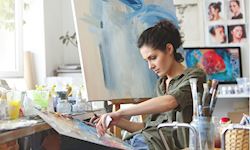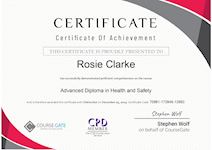Art and Painting Training
Exam Included . CPD Accredited Qualification . Lifetime access . Immediate Result
Course Gate
Summary
- Tutor is available to students
Overview
Art and Painting Training is suitable for anyone aspiring to or already working in this field or simply want to learn deeper into Art and Painting Training.
To make this course more accessible for you, we have designed it for both part-time and full-time students. This course is packed into bite-size module for your convenience. You can study at your own pace or become accredited within hours!
If you require support, our experienced tutors are always available to help you throughout the comprehensive syllabus of this course and answer all your queries through email.
The often overlooked component to create outstanding art and painting is your lack of knowledge and unable to show your creativity.
The Art and Painting Training course is intended for you to refine your fundamental knowledge and skills in art and painting. The course primarily focuses on providing information and relevant knowledge regarding several topics including canvas painting, tips for choosing the right type of brushes, pencil art and the basics of drawing and sketching, enhancing creativity skills and so much more.
Become a professional painter by learning a few painting skills and practice these to extend your services as a business and generate revenue.
Course media
Description
What will you learn in this Art and Painting Training
Module 1
In this module, you will learn all about Painting 101. People have been expressing themselves through painting for thousands of years. Even the cavemen showed great hunts or other events with paints made from berries and plants. There just seems to be an innate need to show others our thoughts, feelings, and ideas through pictures. The phrase “ A picture is worth a thousand words” is so very true.
Module 2
This module will teach you about Understanding Paints. There are two types of paints which work well on canvas. One is oil and the other is acrylic. You need to choose which painting medium you will be using. Some people prefer the oils to the acrylics. There are several differences between the two paints. The oil can take days to dry completely.
Module 3
In this module, you will learn all about Choosing Your Brushes. The first thing you need to know is there are many different types of brushes. Each one is made from different materials for the bristles. You can order sable brushes or hog bristle. There are squirrel brushes. You can buy the synthetic bristle brushes also.
Module 4
This module will teach you about Choosing A Subject. For everything in this world, there is someone who has painted it. Whether it is a person, place, or thing somewhere someone has put it to paint. It does not matter what you choose as your subject, as long as you feel comfortable painting it.
Module 5
In this module, you will learn all about Setting Up Your Studio. There are certain things you will need for your studio. The first thing is a place to paint. Every beginning artist seems to think they can bring out everything and scatter it onto the kitchen table, set up an easel, and start painting. This is great for a day or two. If you want to continue pursuing an art career or hobby, you need a place to keep everything up and ready to go. This way, any time you feel inspired all you need to do is pick up a brush and start painting.
Module 6
This module will teach you about Art Supply Resources. There are many places you can find your painting supplies. Local craft stores and artist supply houses will have many of the supplies you are looking for. When you want it to come to you, there is always the Internet. You need to compare prices when shopping online for your paint supplies. Here is a list of some of the better websites that carry an excellent variety of artist’s tools.
Module 7
In this module, you will learn all about Pay Attention to Detail. The picture above is an actual print done by my mother. This piece was taken from an oil painting she had done. You can actually see the canvas marks when you look closely at it. Look closely at this piece. The name of the painting is “Seaside Greeter”.
Module 8
This module will teach you about Enjoy Your Subject. There is one thing any artist must do when first learning to paint on canvas. This is to choose subjects which interest him. In other words, when you are painting something you do not like, it will show.
Module 9
In this module, you will learn all about Art Schools. There are colleges everywhere that have an art program. Each one can offer great instruction. If you are planning to attend a school for their art program always determine what the curriculum is and what degree you can earn. Some only offer an associate’s degree while others can offer much more. You will have to make the choice as to what you want from the school. Here is a list of art schools to consider.
Module 10
This module will teach you about BRIEF HISTORY OF PENCIL DRAWING. Using a pencil has many advantages, one of which is that it is very easy to erase one’s mistakes. There are famous people in the world who preferred to use pencils.
Module 11
In this module, you will learn all about GETTING STARTED. The age-old debate about the artist’s skills’ versus high-quality materials is still applicable even until today. Quality of tools and materials used affects the artwork.
Module 12
This module will teach you about LEARNING THE BASICS OF DRAWING AND SKETCHING. The tripod grip is the most common way of holding a pen or a pencil. Although it might be the common way of holding a pencil, many people are not doing the tripod grip correctly. The correct way to make a tripod grip is to position the pencil applying equal pressure between the side of the middle finger, the tip of the index finger and the thumb.
Module 13
In this module, you will learn all about Start Your Own Art Business. Aspiring artists may find financial and personal reward from starting their own art business. Whether starting a business centered on your photography, graphic art or paintings, basic business necessities need attention. Meeting regulations and fulfilling responsibilities related to starting a business can help you fulfil your dream with less hassle.
Module 14
This module will teach you about Steps to Creating a Successful Business from Your Art. My personal philosophy for building a long-term, successful career as an artist combines three things—a little business planning, a whole lot of marketing, and most importantly, the ability to create work that resonates with people.
Module 15
In this module, you will learn all about How to Write an Artist Business Plan. When you create art to sell, you’re running a business. For most entrepreneurs, a business plan justifies their reason for being in business. For you, creativity is your justification for making art to sell. A business plan gives you credibility as a serious businessperson by offering production, marketing and financial goals to consider for your startup.
Module 16
This module will teach you about Incorporate Your Business. When you start your own business, it is a good idea to incorporate it as a separate entity. This way, your own personal assets are protected.
Module 17
In this module, you will learn all about Getting Insurance. As stated earlier, house painting is a profession that takes strength and also incurs the risk of injury. You can protect your personal assets by being incorporated., but you also want to protect your business as well. One way to do this is to get business insurance.
Method of Assessment:
Upon completion of the course, you will be required to sit for an online multiple-choice quiz based assessment, which will determine whether you have passed the course (60% pass mark). The test will be marked immediately and results will be published instantly.
Certification
After successfully completing the course, you will be able to obtain the certificates. You can claim a PDF certificate by paying a little processing fee of £2. There is an additional fee to obtain a hardcopy certificate which is £9.
Who is this course for?
Art and Painting Training is suitable for anyone who want to gain extensive knowledge, potential experience and professional skills in the related field.
Requirements
Art and Painting Training is open to all from all academic backgrounds and there is no specific requirements to attend this course. It is compatible and accessible from any device including Windows, Mac, Android, iOS, Tablets etc.
Career path
This course opens a new door for you to enter the relevant job market and also gives you the opportunity to acquire extensive knowledge along with required skills to become successful. You will be able to add our qualification to your CV/resume which will help you to stand out in the competitive job industry.
Questions and answers
Could you kindly confirm the time limit of this course please
Answer:Dear Alex, Good morning. You will get lifetime access to the course after purchasing, and you can complete it anytime. You can study the course at a convenient time. Thanks
This was helpful.What is the qulifications
Answer:Hi Kavindhya, Thanks for your query. This is an personal development course and it is accredited by CPD. Diploma in Art and Painting is Level 3 course. Many thanks.
This was helpful.
Reviews
Currently there are no reviews for this course. Be the first to leave a review.
Legal information
This course is advertised on reed.co.uk by the Course Provider, whose terms and conditions apply. Purchases are made directly from the Course Provider, and as such, content and materials are supplied by the Course Provider directly. Reed is acting as agent and not reseller in relation to this course. Reed's only responsibility is to facilitate your payment for the course. It is your responsibility to review and agree to the Course Provider's terms and conditions and satisfy yourself as to the suitability of the course you intend to purchase. Reed will not have any responsibility for the content of the course and/or associated materials.




